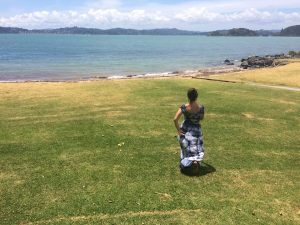 You can make this a litany with the responses in bold italics, and substitute the indigenous, Māori language words with the English translations in square brackets—although you might appreciate the explanation of these concepts in the footnotes.
You can make this a litany with the responses in bold italics, and substitute the indigenous, Māori language words with the English translations in square brackets—although you might appreciate the explanation of these concepts in the footnotes.
By faith, Mary let go of fear, and engendered a mothering God.
This faith may lead us through labyrinths of doubt, laughing hysterically, shouting in protest, lurching in denial, finally making it to our tūrangawaewae.1 [our foundation, our place in the world, our home]
By faith, Joseph took comfort from a dream, embracing complex, reconstituted, extended family relationships.
This faith might reshape our preconceptions, birthing new ways of being whānau 2. [inclusive, hospitable, connected family]
By faith, wise ones followed the path of a new star to a strange land, to an undistinguished stable.
This faith might sometimes lead us down unpaved tracks, with people we don’t recognise, to destinations we didn’t plan.
Faith is the opposite of belief:
a bright-side-up coin whose shadow-side is hope.
Faith is relationship and way of life:
caring for orphans and widows, casting out demons of self-doubt and despair, and occasionally raising the dead.
This is our faith:
Living as if we matter.
Living with uncertainty yet acting with confidence, walking the star-led spiral to the heart of everything:
God in us, now—and here.
You can use this work under a Creative Commons Attribution-Noncommercial-Share Alike 3.0 New Zealand License.
1 Tūrangawaewae is one of the most well-known and powerful Māori concepts. Literally tūranga (standing place), waewae (feet), it is often translated as ‘a place to stand’. Tūrangawaewae are places where we feel especially empowered and connected. They are our foundation, our place in the world, our home.
2 Whānau is often translated as ‘family’, but its meaning is more complex. It includes physical, emotional and spiritual dimensions and is based on whakapapa (genealogy—literally: to place in layers). Whānau can be multi-layered, flexible and dynamic. Whānau is based on a Māori and a tribal world view. It is through the whānau that values, histories and traditions from the ancestors are adapted for the contemporary world.
Source: Te Ara The Encyclopedia of New Zealand
Explore Bronwyn’s website here: words of spirit and faith | bronwyn angela white
Liturgy for faith communities or personal reflection, created for Southern Hemisphere, South Pacific & specifically Aotearoa New Zealand celebrations and seasons—
Photo: New Zealand dream, Mandla Daley